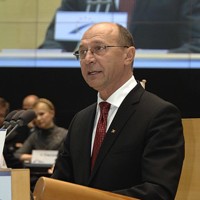In 2000, when Austrian Chancellor Wolfgang Schüssel formed a coalition government with Jörg Haider’s far-right populist Freedom Party of Austria (FPÖ), the 14 member states of the European Union immediately agreed to sanction the country. Acting on the basis of bilateral relations, as the EU Treaty did not justify such sanctions, the EU member states froze diplomatic relations and sought to isolate Austria in international institutions, despite the fact that Haider and his FPÖ had been democratically elected. Today, with populism on the rise across the member states of the EU, this kind of forceful reaction is no longer even imaginable.
The issue takes on added urgency in the face of what many fear is an erosion of democratic norms in Eastern Europe over the past several years. Last week, Romanian Prime Minister Victor Ponta, leader of the left-wing Social Democratic Party (PSD), used his parliamentary majority to suspend President Traian Basescu, who is close to the center-right opposition Democratic Liberal Party (PDL), over alleged abuses of power -- a move that some Romanian members of the European Parliament did not hesitate to call a putsch.
A vote on July 6 by the pro-government majority in parliament to suspend Basescu from office and initiate an impeachment referendum led to Basescu being replaced by an acting president, Crin Antonescu, leader of Ponta’s coalition partner, the National Liberal Party (PNL). Antonescu had previously become Senate president on July 3, when Ponta’s coalition replaced the speakers of both houses of parliament and the country's ombudsman, voted to curb the Constitutional Court's powers to overrule parliamentary decisions and threatened to sack judges who oppose its decisions.

